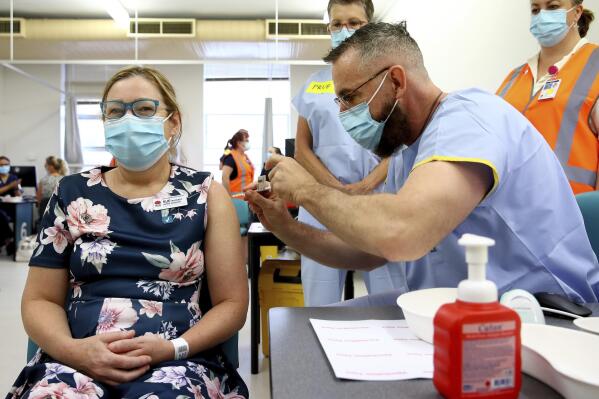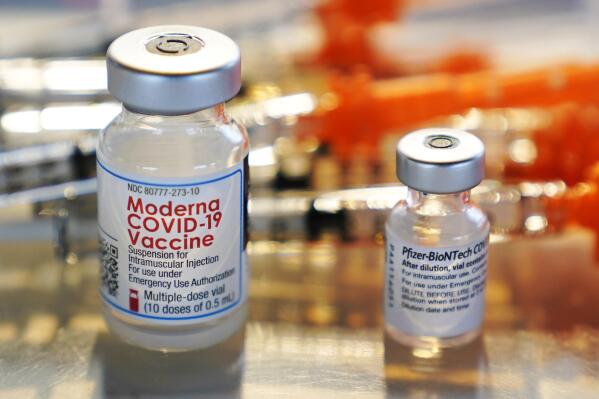CLAIM: New data on the numbers of births in the Australian state of New South Wales shows that coronavirus vaccines “destroyed” human fertility.
AP’S ASSESSMENT: False. The data being cited doesn’t mention vaccines at all and doesn’t draw any link to their impact on birth rates. Demographic experts in Australia say the drop in number of babies born in New South Wales hospitals, which is the focus of the chart, is explained by social and economic factors such as high housing prices, job insecurity and pandemic-era lockdowns. They also note that birth rates in Australia and other developed nations were already trending downwards years before COVID-19 vaccines were even created.
THE FACTS: Social media users are claiming new data shows birth rates are plummeting as a result of vaccines developed against the coronavirus.
Many are sharing a screenshot of a post featuring a line chart titled, “Babies born in NSW hospitals.”
The chart, which is partly cut off in the screenshot, purports to show the number of babies born per quarter in New South Wales hospitals from March 2010 to March 2023. The numbers fluctuate within a relatively narrow range over the years shown on the chart before plummeting dramatically.
“The world is about to discover the COVID vaccines destroyed fertility,” wrote one user on Instagram who shared the screenshot.
But the chart comes from an article published in The Sydney Morning Herald last month that makes no mention of COVID vaccines.
Drawing from publicly available data from the Australian state’s Bureau of Health Information, the story examines declining births at New South Wales public hospitals during the first three months of 2023.
It found that the number of babies born at the hospitals was 15,868, down from a peak of 19,081 in 2021 and the lowest of any quarter since 2010.
The article quotes a range of experts who argue that socio-economic factors are driving the birth declines.
Liz Allen, a demographer at the Australian National University in Canberra who is quoted in the story, confirmed to The Associated Press that “cost-of-living pressures, housing affordability, insecure employment, gender inequality” are among things forcing young Australians to hold off having children.
“The story of declining births in NSW is a complex social one, not a reductionist anti-vax fear mongering horror story,” Allen wrote in an email Tuesday.
Udoy Saikia, a social demographer at Flinders University in Adelaide who is also cited in the Sydney Morning Herald story, noted that during the 2020 pandemic lockdowns, some couples moved up plans to have children while working from home and having their movements restricted.
“As a result, there was a significant increase in the number of births during the subsequent 2021 period, followed by a decline in birth rates in the latter half of 2022 and the first quarter of 2023,” he wrote in an email Tuesday.
Saikia predicted birth numbers would eventually fall back within the normal range.
“This situation can be likened to historical instances observed in many parts of the world during post-conflict or post-war periods, where a baby boom resulting from the reunion of couples is eventually succeeded by a decline in the number of births,” he wrote.
Allen added that birth rates in Australia, like other parts of the world, have been trending downwards for years, if not decades.
“Today worldwide most people live in countries with below-replacement level fertility,” she wrote. “That is, the average total fertility rate is below 2.1 births per woman for most populations.”
Indeed in the U.S., fertility rates have been steadily dropping since 2010, with a slight uptick in 2021, followed by a dropoff last year, said David Daigle, a spokesperson for the U.S. Centers for Disease Control and Prevention.
What’s more, a 2022 study funded by the National Institutes of Health, the U.S. government’s primary public health research agency, found COVID-19 vaccines do not reduce the chances of conception, as some critics have claimed.
In fact, the study of more than 2,000 couples found infection from the virus itself was associated with a short-term reduction in male fertility.
Researchers concluded that the study reinforced the importance of COVID-19 vaccination for couples trying to conceive.
___
This is part of AP’s effort to address widely shared misinformation, including work with outside companies and organizations to add factual context to misleading content that is circulating online. Learn more about fact-checking at AP.
#Social #media #posts #falsely #suggest #Australian #birthrate #drop #caused #COVID #vaccines













Leave a Reply